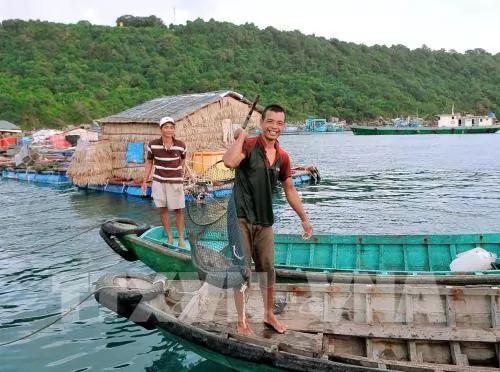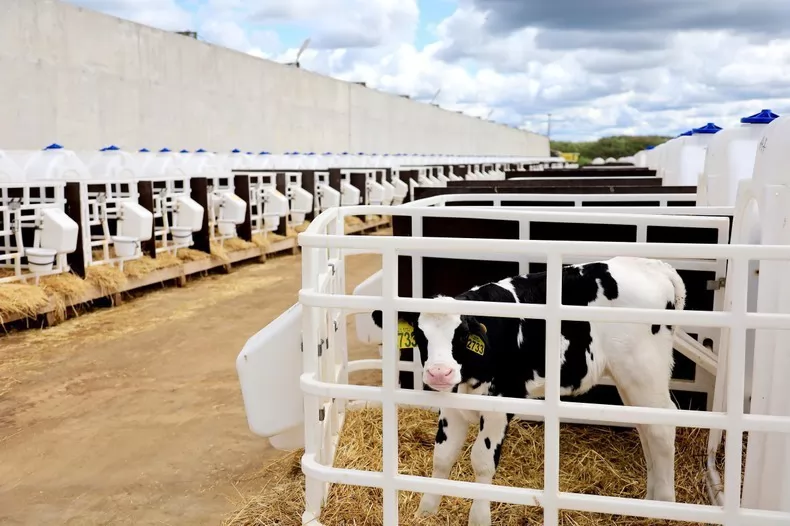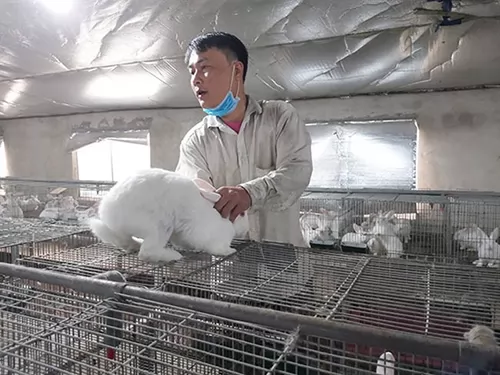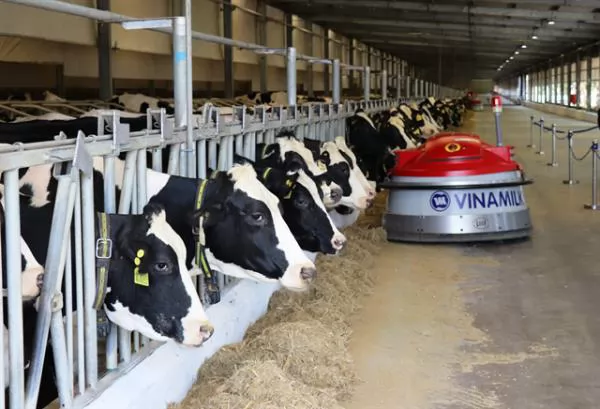Marine aquaculture brings high profits to Kiên Giang farmers

Fishmen at Thổ Chu Island in Kiên Giang Province's Phú Quốc District. - VNA/VNS Photo Lê Huy Hải
KIÊN GIANG – Breeding marine fish in floating cages has offered high profits for farmers in Kiên Giang Province’s coastal areas and islands.
The Cửu Long (Mekong) Delta province has 4,500 floating fish cages on the island communes of Kiên Hải and Phú Quốc in Kiên Lương districts and Hà Tiên City.
Last year marine aquaculture output reached 3,550 tonnes and is expected to increase to 4,300 tonnes this year, according to the provincial Department of Agriculture and Rural Development.
The price of marine fish fluctuates every year, but still offers high profits for farmers, said the department.
Farmers who breed cobia with a density of 150 - 200 fish in a 50 cu.m cage have a profit margin of 40 per cent in the first breeding crop. For the following crops, the profit is higher as there are no initial costs for cages and other items.
Cobia, which can reach a weight of 6 kilogrammes after 12 – 14 months of breeding, sells at a price of VNĐ120,000 - 135,000 (US$5.1 – 5.8) a kilogramme.
Nguyễn Minh Được, who breeds cobia and grouper in 25 floating cages in Kiên Lương’s Hòn Nghệ Commune, said he used to fish at sea but switched to breeding marine fish in 2007 because of the low number of catches of natural marine fish.
He also buys and sells marine fish fry for breeding, he said.
“My family earns a profit of VNĐ500 - 700 million ($21,500 – 30,000) a year from breeding marine fish and trading fish fry,” he said.
Nguyễn Đức Minh, chairman of the Hòn Nghệ Farmers Association, said marine cage aquaculture has become the commune’s key economic sector.
The number of marine fish cages in the commune has risen from more than 100 cages in 2010 to 1,200 cages now owned by more than 100 households, he said.
Cobia, grouper, red drum and pomfret are the fish mostly bred, with cobia and grouper accounting for the largest proportion.
Besides traditional marine fish like cobia and grouper, the province is breeding more kinds of marine fish species and other marine species.
Quảng Trọng Thao, deputy director of the department, said the province has recently successfully bred marine fish species like giant trevally which has have high economic value.
“Lobsters are also being bred on a pilot basis and on a small scale in Kiên Lương District,” he said.
In Kiên Hải District, the local Agriculture and Fishery Extension Station and Hòn Tre Commune Farmers Association last month began breeding Pacific oysters in floating cages in the district’s Hòn Tre Commune.
With nearly 200 kilometres of coast and many islands, the province has favourable natural conditions for developing marine aquaculture.
Expansion
The province plans to expand marine aquaculture on an industrial scale and in combination with fishery services and tourism.
To achieve better results, it will set up zones for marine aquaculture and invest in production of marine fish fry, fish food and other products for marine aquaculture. It will also invest in infrastructure like power supply and roads for the islands.
The province plans to call on more domestic and foreign companies to invest in marine aquaculture using advanced breeding techniques like high-density polyethylene (HDPE) floating cages.
The HDPE floating cages can withstand winds and waves and contain a larger quantity of fish than traditional floating cages.
In recent years Trấn Phú Trading and Import-Export Co., Ltd in Phú Quốc District has used HDPE floating cages with Norwegian techniques to breed white pomfret and red drum in Gành Dầu Commune.
Last year, the province gave approval to the Mavin Group to invest in breeding marine fish in Kiên Hải District for export. The $30 million project will cover 2,000ha of water surface and is scheduled to operate in 2021. It will produce 30,000 tonnes of marine fish a year.
In addition, Australis Aquaculture Việt Nam Limited will apply for investment in a project to breed marine fish in Kiên Hải’s Nam Du Commune. The $25 million project is expected to cover more than 3,150ha of water surface and produce 15,000 tonnes of marine fish a year.– VNS
Maybe you are interested

Exploiting potential of dairy industry
In recent years, Vietnam's dairy industry has gained many positive results, with the development of a number of closed chains from production to consumption.

Tuyên Quang rabbit farmer profits from raising New Zealand breed
TUYÊN QUANG - Raising New Zealand rabbits is providing a good income - about VNĐ200 million (US$8,600) net profit per year - to Nguyễn Công Định, living in the northern province of Tuyên Quang, as restaurants have a high demand for rabbit meat.

Numerous dairy firms enjoy profit growth in Q3
HÀ NỘI — A number of dairy companies reported positive earning results in the third quarter of this year after restructuring their businesses.





